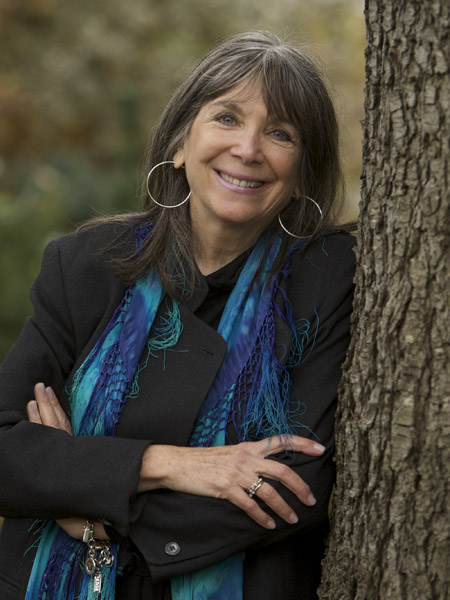
By Donald H. Harrison

SAN DIEGO — When she was 13 years old, Cara Weiss had the opportunity to audition for a major movie role: that of Anne in The Diary of Anne Frank. She didn’t get the part, but she got something better. She identified so strongly with Anne, that she began writing to Otto Frank, Anne’s father. At first, Frank discouraged the correspondence, but her persistence and enthusiasm stormed his wall of reserve. He became to her a grandfatherly figure, and she became to him–what?–a personification of what might have been if his sweet daughters Anne and Margot had survived the Holocaust.
Before they actually met, Weiss and Frank corresponded for 18 years, during which time she transformed from a teenager, to a college student, to an advertising copywriter, to the wife of Kent Wilson and mother of two sons, Ethan and Jesse. Along the way, she asked–and received–Frank’s advice, and she reveled in being one of a select group of youngsters around the world who maintained such a special relationship with a man whose daughter’s diary made his name known around the world.
The emotional climax of Cara Weiss Wilson’s book, Dear Cara: Letters from Otto Frank, came when after all those years of thinking about Anne, comparing herself to Anne, gleaning lessons from Anne’s life, and corresponding with Anne’s father, Cara went to the Secret Annex in Amsterdam, Holland, where she was given a tour by Miep Gies, the Dutch woman who aided the Frank family, and then on to Basel, Switzerland, to hug and be hugged by Otto Frank and his second wife, Fritzi. It would be difficult for anyone to read these passages without being caught up in their deep emotion. Cara loved Otto Frank with a chaste passion.
Otto died two years after the meeting, with Fritzi maintaining the correspondence towards and beyond Otto’s end. Otto imparted many lessons that became fundamental to Cara’s own belief system. One was the idea that revenge serves no good purpose . In the three days that they spent together in Basel, Otto told Cara that he was certain of the identity of the man who had betrayed his family, but he did not want to ever speak his name publicly. Why? The man’s children were blameless, and they would be the ones who would bear the brunt of their father’s deeds. How would you like to be known as the child of the man who sent Anne Frank to her murder? Furthermore, revelation would not bring back Anne or Margot, nor his first wife, Edith, nor members of the other families who hid with them.
Those familiar with stories from the Talmud will recognize a second lesson that Otto imparted: even if the world seems to be ending, plant a tree. There was a period when Cara’s world in fact seemed to be ending. The family went bankrupt, she lost her house, her marriage dissolved, her children lived elsewhere, and she had a life-threatening disease. As one might imagine, she was terribly depressed, near suicidal. And what saved her? Her pets. She asked herself if she surrendered to her depression, who would take care of the animals? In a sense, safeguarding their lives was the tree she planted.
In the epilogue to Dear Cara, we learn that in the aftermath of her divorce, Cara left Los Angeles and moved to the Monterey Peninsula, where a friend suggested she could make a new start. Drawing on Otto’s advice, Cara did not publicly vent any grievances she might have had against her ex-husband, whom she now claims as a friend along with his second wife. Eventually, that “tree” Cara planted bore fruit: a man who lived nearby and also loved animals — Peter Granat — came into her life, and they were married. The couple moved from the Monterey area to the Sacramento area, and just six months ago, in order for Peter to take a promotion in the Jared’s jewelry store chain, they moved to San Diego, finding themselves an apartment not far from Peter’s work in Mission Valley.
Now in San Diego, Cara is beginning to make speaker’s rounds of service clubs as well as Jewish and interdenominational groups, and is giving lectures about Otto and Anne Frank. She also lectures about surviving emotional traumas. A second book, Nature Teachers: Simple Lessons of Life Taught by the Most Unlikely Masters, provides meditations from such living creatures as a clam (which turns an irritant into a pearl), an otter and a spider, and such inanimate objects and forces as a stone and lake, rock and wave, and a river.
After arriving in San Diego, Cara completed and published a third book, It Takes A Lot of Sh*t To Make A Garden Grow, which speaks not only of her experience overcoming adversity and thereby improving herself, but which also incorporates lessons learned by friends and relatives. Not surprisingly, the author drew emotional sustenance from the lessons she was privileged to learn from Otto Frank.
Along her journey, Cara obtained a license to become an officiant at secular weddings. She uses her writing skills to create personalized occasions. Describing herself as a romance-aholic, she interviews couples before their marriages and fashions true stories based on those interviews to be read for the first time at the wedding ceremony. The stories tell how the couples met and what were the qualities about each other that were attractive in the development of the relationships. Cara Wilson-Granat maintains a website at www.wordsfromcara.com
*
Harrison is editor of San Diego Jewish World. He may be contacted at donald.harrison@sdjewishworld.com
Great article. What a beautiful woman!